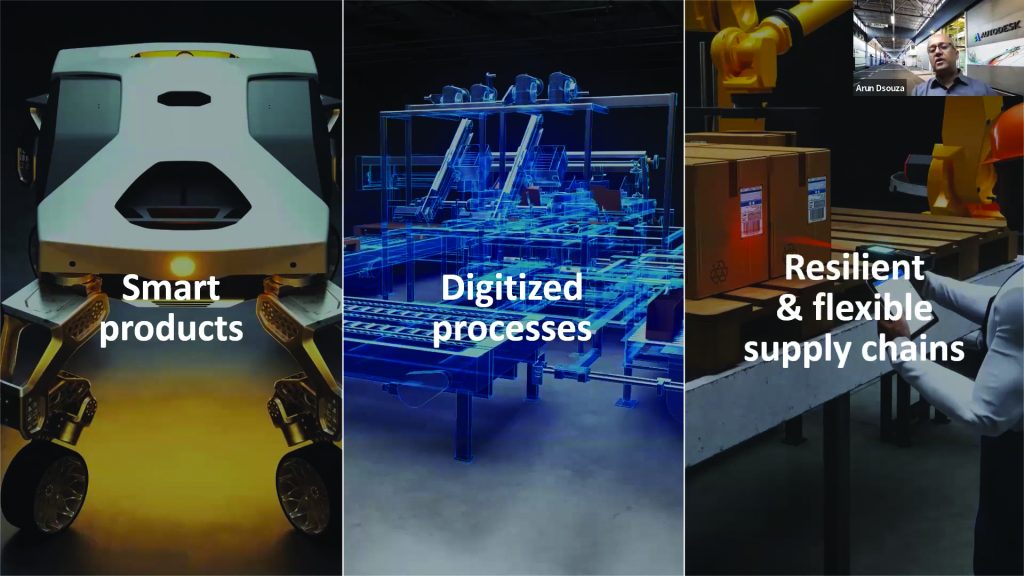Manufacturing requires quick solutions. To improve production, engineers need AI, machine learning, and big data analytics. They simplify complex issues and enable collaboration between humans and technology to make efficient, sustainable products that meet evolving user needs.
Recently, the ‘Convergence of Design to Advance Manufacturing’ webinar, powered by Manufacturing Today and presented by Autodesk, brought together industry experts to discuss making manufacturing safer, more efficient, and more precise.
A customised digital transformation
During the webinar, keynote speaker Arun D’souza, Country Manager of the Digital Manufacturing Group for India and ANZ at Autodesk, highlighted the omnipresence of Autodesk software in various industries. He emphasised the need for customisation of digital transformation to meet individual client needs and create value. D’souza pointed out the high failure rate of new products and the need for smart product creation, digitizing the process, and building a resilient supply chain. He suggested that companies with fully programmed systems for automation and data storage and a designer who understands manufacturing will thrive in the future.

Augmenting each stage with AI, machine learning and big data analytics
The moderator for the webinar, Ashok Muthuswamy, Vice President, BE & TQM, TAFE, set the ball rolling by discussing the increased pressure of introducing new products on designers and engineers coupled with the scarcity of resources.
Autodesk India’s Technical Solution Manager, Sachin Fulsundar, believes that AI is empowering engineers to create better designs. The design phase is critical as it involves decisions on product features, functionalities, and manufacturing. Incorporating automation and improved algorithms into existing systems can enhance the design process. Fulsundar notes that two decades ago, design and manufacturing were working in isolation, but AI and machine learning are now connecting and complementing both sectors. Data-driven designs are popular in IT and can be used in manufacturing. Praj Industries’ VP of Manufacturing & Operations, Sandeep Kinkar, states that cloud computing, big data analytics, AI, and VR are taking over the mechanical manufacturing sector. Big data analytics can help identify error patterns and improve manufacturing processes.
Advanced manufacturing
During the discussion, Muthuswamy posed an interesting question to Vivek Jere, Head – COE Manufacturing Engineering Services, HCL Technologies – “How would you suggest taking such conventional operations to an advanced manufacturing level and how to plan for this transition?”

Jere responded, “Conventional operations need to be advanced to the manufacturing level to achieve time, cost, quality, sustainability, scalability, etc.” These requirements need to be met to remain relevant in the market. He added, “While many technologies are available in the market, companies should identify the top challenges the firm faces, quantify them and develop a vision to meet these challenges by seeking the help of a consulting firm to identify the technology that will be most suitable for their business.”
Commenting on ways to justify advanced manufacturing, Sunil Shrivastav, Business Head, Minda Industries, said, “Any investment in a business has to be backed up by an RoI, even advance manufacturing for that matter. In India, we face pushback for advance manufacturing due to the availability of cheap labour vis-à-vis Europe or any other country. Hence, a lot of proposals get rejected.” He recommended that the best way to justify this is by showing the RoI, and different cost advantages in terms of productivity and quality improvement. It is important to apprise the management of the intangible benefits associated with advance manufacturing and lastly to link it with the company’s vision and goals.
On leveraging the existing ERP investments to monitor operations Gajendra Yadav, Head – Production, Crompton Greaves, stated, “Each machine and workstation need to be digitalised to capture relevant data and the digital information, with the help of the cloud, can directly be linked to the ERP system.”
Trends to look out for
According to Karthik Raman, Head Product Management – India & Middle East – Metal Cutting Business, Kennametal, hybrid manufacturing is an up-and-coming process “that combines the technology of additive and subtractive manufacturing. There is an increasing adoption trend in automotive, medical and aerospace because it gives flexibility in terms of the production of complex parts that cannot be manufactured in a traditional way and also provides precision and reduces material waste. It is expensive to incorporate but once the scale of production and adoption level increases in the market it will offer a lot of flexibility to the manufacturers.”
Additionally, certain machine learning and AI-related tech are also expected to disrupt the industry in the future. According to Raman, “multiple techs will converge and create a disruption in the coming years such as reinforcement learning – a branch of machine learning, widely used in robotics and healthcare; generative adversarial networks – deep learning algorithms that find application in fashion and product prototype development; edge computing – which is gaining prominence in autonomous vehicles, IoT devices and smart homes; sleeping giant quantum computing, which is still at an early stage of revolution but deals with particles and molecules at the sub-atomic level and is expected to disrupt the drug industry.”
Way forward
Informative and intriguing, the webinar offered insightful takeaways. The panel agreed that companies should connect their processes and establish a data repository to enhance productivity and break down silos. Adopting suitable technologies and processes while encouraging a cultural shift will help companies stay ahead of the curve.
